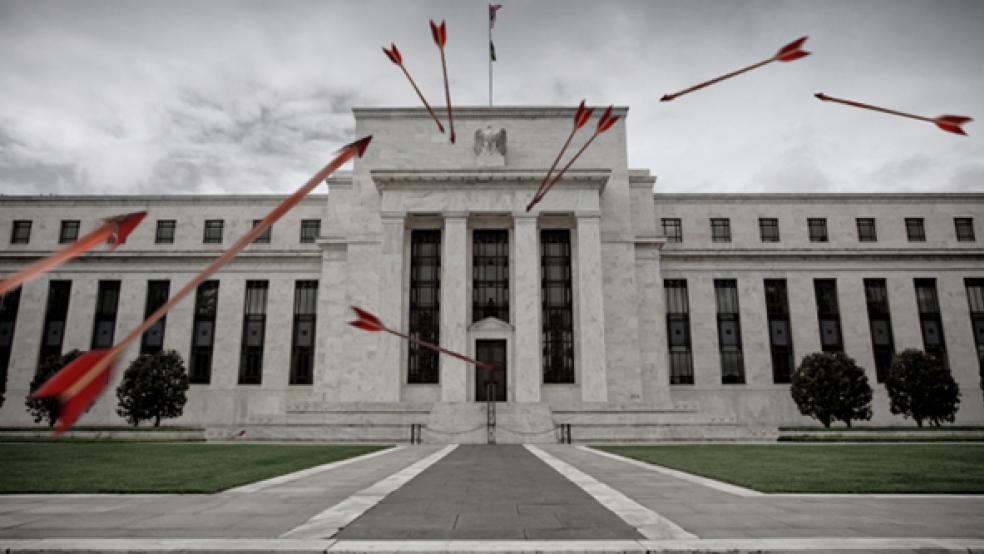Republicans have been relentlessly attacking the Federal Reserve and implicitly threatening its independence. Texas Governor and GOP presidential candidate Rick Perry asserted that Ben Bernanke’s actions to help the economy are “almost treasonous,” and top congressional leaders—Senate Minority Leader Mitch McConnell, Senate Minority Whip John Kyl, House Speaker John Boehner, and House Majority Leader Eric Cantor – wrote an open letter to the central bank urging it to avoid any further monetary stimulus.
The reasons for the attacks vary. Some members of the GOP are using fear of inflation to try to gain support for their goal of returning the economy to a gold standard. Others are genuinely concerned about inflation. And then there is a group of conservatives that don’t like the degree of government interference in the economy that the Fed has engaged in lately. Plus it’s hard not to suspect that in some cases it’s as simple as opposing anything that might help President Obama’s reelection chances. However fear of inflation, even hyperinflation, is almost always cited as a concern.
But if these attacks are successful and the Fed’s independence is compromised, we are likely to get the inflation that the GOP’s assault on the Fed is supposed to prevent. The reason for this is that when monetary policy is under the control of politicians, government spending is much more likely to be financed by printing money. If a government raises taxes to pay for the spending, it is sure to alienate some constituency, and borrowing to finance the spending can also create problems – when the debt gets too large it can be political poison.
But paying for spending by printing money obscures the connection between the government expenditure and the way it is paid for – through inflation – and thus carries fewer political risks. To make it worse, when politicians control the money supply there is also a temptation to stimulate the economy through money expansion prior to an election, and little reason reverse the action and risk a recession after the election. And as this is repeated over many elections, inflation ratchets up to higher and higher levels. There is risk in the long-run as inflation continues to rise, but that doesn’t stop politicians focused on getting reelected from using this strategy.
The best way to minimize these dangers is to put monetary policy in the hands of an independent central bank so that the long-run risks can be properly accounted for. But in order for this to work, the independence of the central bank – in this case, the Fed -- must be respected by politicians. Dallas Fed President Richard Fisher told this story about Fed independence during a speech given at the 2006 Allied Social Science Meetings in Boston, Massachusetts:
As a Texan, I am mindful of the story about William McChesney Martin, Fed chairman from 1951 to 1970. President Johnson invited him down to his Texas ranch for what turned out to be a one-on-one meeting. The president wanted a more accommodating monetary policy, and Martin, a strong advocate of Fed independence, tried to explain to him the consequences of that course of action. Johnson would have none of it and advanced on Martin, shoving him around the room and shouting, “Boys dying in Vietnam, and Bill Martin doesn’t care!” Years later, Martin expressed his regrets about shifting policy to suit the president. “To my everlasting shame,” he said, “I finally gave in to him.”
As Bruce Bartlett notes, “This caused inflation to jump from 3 percent in 1967 to 4.7 percent in 1968, and 6.2 percent in 1969.” The troubles continued through the 1970s as inflation reached 13.3 percent in 1979, partly because of the incompetence of the Fed chair at that time, G. William Miller, and it wasn’t until the Fed asserted its independence under Paul Volcker’s leadership in the early 1980s that inflation began to be controlled.
From that time on, and during the Clinton and Bush presidencies in particular, the Fed’s independence was respected by Congress and the administration. The calm economic times associated with the Great Moderation played a big role in this, and as long as the economy appeared to be functioning well, there was no reason to be critical of the Fed. That’s not to say that everyone agreed with the Fed’s decisions; they didn’t. But the institution itself was not under attack.
The Great Recession changed that. The Fed has been criticized from all sides for its role before and during the crisis, justifiably, and as noted above, the GOP has been particularly pointed it its attacks.
But compromising the Fed’s independence is not the answer. That would undermine the ability of the central bank to address business cycle downturns, and it would also allow politicians to monetize the debt and escape the hard decisions that will be needed to reduce the long-run debt to a sustainable level. The end result would be the inflation that the GOP says it fears.
I have no problem with institutional changes that might improve Fed policy. For example, I don’t think the voice of the unemployed is adequately represented in monetary policy decisions, and reform of the selection process for the monetary policy committee could address this problem. But reducing the Fed’s independence – or using the explicit or implicit threat of doing so in an attempt to influence policy – would be a big mistake.






